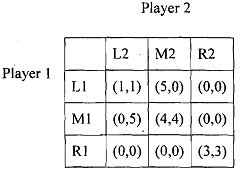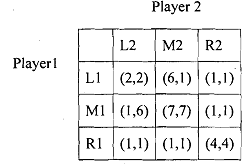Finitely Repeated Games:
The argument stated above holds more generally. We generalise the concept of repeated games to games with finite number of repetitions. Let G = (A1, A2. ., An; u1, U2, , un) denote a static game of complete information in which players 1 through n simultaneously choose their strategies a, to a, respectively from their strategy spaces SI through S,. This game is repeated T times after collecting and observing the outcomes of each game. The game G is called the stage game of the repeated game.
Definition: Given a stage game G, let G(T) denote the finitely repeated game in which G is played T times, with the outcome of all the previous games observed before the next play begins. The payoff for G(T) is simply the sum of the payoffs from the T stage game.
Proposition: If a stage game G has a unique Nash equilibrium then, for any finite T, the repeated game G(T) has a unique sub-game perfect Nash. equilibrium: the Nash equilibrium of G being played in every stage of the game.
It is interesting to investigate if there is more than one Nash equilibrium in the stage game itself. What will be the nature of the equilibrium when the game is repeated? We consider a simple two period game, which is a simple extension of the prisoners' dilemma such as there are two Nash equilibria in it. In addition to the strategies L1 and M1, we add another strategy R1 at the disposal of player 1. Similarly, we add the strategy R2 to the strategy space of player 2. The game is described below in normal form.

As a result of adding the two strategies and the distribution of payoffs now there are two pure strategy IVash equilibrium, namely, (Ll, L2) and (Rl, R2). Suppose the above stage game is played twice with the first stage outcome being observed before the second stage begins. Since the stage game has more than one Nash equilibrium, it is now possible for the players to anticipate that different first stage outcomes will be followed by different stage game equilibria in the second stage. Let us suppose for example the players anticipate that (RI, R2) will be the second stage outcome if the first stage outcome is (Ml, M2), but (1,1, L2) will be the second stage outcome if any one of the eight other first stage outcomes occur. Thus, the game reduces to the following one shot game, where (3, 3) has been added to the (MI, M2) cell and (1, 1) has been added to rest of the cells.

There are three pure strategy Nash equilibrium of the above game (Ll, L2), (Ml, M2) and (Rl, R2). Let us denote the outcome of the repeated game as [(w, x): (y, z)]; where (w, x) is the first stage outcome and (y, z) is the second stage outcome. Therefore, the Nash equilibria namely, (Ll, L2), (MI, M2) and (Rl, R2) can be achieved in the simplified one shot game if the outcomes of the repeated game are [(Ll, L2), (L1 , L2)], [(Ml, M2); (Rl, R2)] and [(Rl , R2), (Ll, L2)] respectively (if the first stage outcome is (Ll, L2), the second stage outcome has to be (Ll, L2) according to the players' anticipation and so on for each of the one shot game's Nash equilibria). The first and the last Nash equilibria of the repeated game are sub-game perfect and simply concatenate the Nash equilibrium outcome of the stage game. But the Nash equilibrium (MI, M2) of the one shot game is possible if the outcome of the repeated game has the sub-game perfect outcome [(MI, M2); (Rl, R2]], which means in the first stage, the players chose (MI, M2) which is not a Nash equilibrium of the stage game. We can conclude that cooperation can be achieved in the first stage of a sub-game perfect outcome of a repeated game.
Proposition: We extend this idea to a stage game being played T times, where T is any finite number. If is a static game of complete information with multiple Nash equilibria, then there may be sub- game perfect outcomes of the repeated game G(T) in which for any t< T, the outcome in stage t is not a Nash equilibrium of the stage game G The main points to extract from the above example is that
is a static game of complete information with multiple Nash equilibria, then there may be sub- game perfect outcomes of the repeated game G(T) in which for any t< T, the outcome in stage t is not a Nash equilibrium of the stage game G The main points to extract from the above example is that
- credible threats or promises about the future behaviour can affect current behaviour
- sub-game perfection (as we described in the previous unit) may not be a definition strong enough to embody credibility.